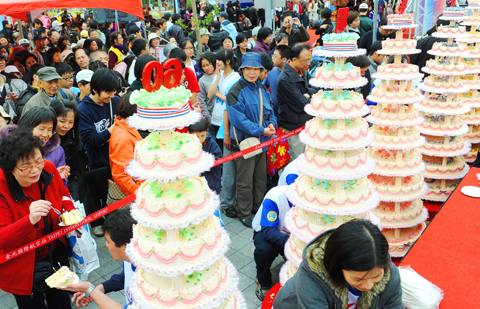Some of Taipei Songshan Airport’s senior employees recalled the history of the nation’s first international airport as it celebrated its 60th anniversary yesterday.
Chang Tsai-hsin (張彩杏), 54, started working at Taipei Songshan Airport in 1971 just after graduating from junior high school. Over the decades, she worked her way up from a part-time employee to secretary to the director of the airport’s office.
Chang’s first job was selling tickets at the entrance to the airport’s waiting room.

PHOTO: CHANG CHIA-MING, TAIPEI TIMES
“If families wanted to accompany passengers to the waiting room, they would have to purchase tickets first. The waiting room had a platform where they could see the aircraft. Tickets for adults cost NT$5 each, and tickets for children cost NT$2,” she said, adding that her monthly salary at the time was NT$1,400.
The Songshan Airport was first used as a Japanese military airport during World War II. In 1936, the airport started providing the direct flight service to Osaka.
Wei Sheng-chih (魏勝之), director of the Taipei Airport office, said that at the time, only officials from the colonial government and privileged citizens could take flights.
Air China, which was then owned by the Chinese Nationalist Government, provided flights from Songshan to Shanghai as well as to Fuzhou between 1946 and 1949, said Wei, adding that the Civil Aeronautics Administration later began operations in Taiwan on April 16, 1950 and launched flights from Taipei to Hong Kong.
TransAsia Airways (復興航空) was established in 1951 and offered domestic flights from Taipei to Hualien and Kaohsiung. By 1978, the airport offered 188 international and domestic flights a week, with more than 17,000 passengers a day.
Songshan was both an international and domestic airport until 1979, when the government decided to move international flights to the Taoyuan International Airport. Songshan continued as a domestic airport, resuming its function an international airport when cross-strait flight service was launched in 2008.
As a gift for the Songshan Airport’s 60th anniversary, Chang dedicated her painting of Alishan (阿里山) to the airport.
“I had the idea of painting Alishan when the government allowed Chinese tourists to come and visit Taiwan,” Chang said.
“I wanted to introduce the nation’s most beautiful scenery to the Chinese tourists — the cherry blossoms and the Forest Railway in Alishan,” she said.
Chang said it took her about a month to finish the painting, which was about 1.78m in length and 0.95m in width.
Wang Mei-chi (王梅芝) and Liu Mei-ping (劉美萍) have also been working at the airport for nearly 40 years. Wang’s first job at the airport was in the airport’s elevator, while Liu served as a phone operator.
Wang said she worked at the airport during the day and went to school at night. Unlike the nicely dressed elevator ladies that one see in department stores today, Wang said she simply wore her student uniform to work.
Working as an operator, Liu recalled that the operator service had to be available 24 hours a day back then.
To mark the airport’s 60th anniversary, the Taipei Airport Office yesterday hosted a variety of celebrations at the plaza in front of the Airport’s terminal.

An essay competition jointly organized by a local writing society and a publisher affiliated with the Chinese Communist Party (CCP) might have contravened the Act Governing Relations Between the People of the Taiwan Area and the Mainland Area (臺灣地區與大陸地區人民關係條例), the Mainland Affairs Council (MAC) said on Thursday. “In this case, the partner organization is clearly an agency under the CCP’s Fujian Provincial Committee,” MAC Deputy Minister and spokesperson Liang Wen-chieh (梁文傑) said at a news briefing in Taipei. “It also involves bringing Taiwanese students to China with all-expenses-paid arrangements to attend award ceremonies and camps,” Liang said. Those two “characteristics” are typically sufficient

A magnitude 5.9 earthquake that struck about 33km off the coast of Hualien City was the "main shock" in a series of quakes in the area, with aftershocks expected over the next three days, the Central Weather Administration (CWA) said yesterday. Prior to the magnitude 5.9 quake shaking most of Taiwan at 6:53pm yesterday, six other earthquakes stronger than a magnitude of 4, starting with a magnitude 5.5 quake at 6:09pm, occurred in the area. CWA Seismological Center Director Wu Chien-fu (吳健富) confirmed that the quakes were all part of the same series and that the magnitude 5.5 temblor was

The brilliant blue waters, thick foliage and bucolic atmosphere on this seemingly idyllic archipelago deep in the Pacific Ocean belie the key role it now plays in a titanic geopolitical struggle. Palau is again on the front line as China, and the US and its allies prepare their forces in an intensifying contest for control over the Asia-Pacific region. The democratic nation of just 17,000 people hosts US-controlled airstrips and soon-to-be-completed radar installations that the US military describes as “critical” to monitoring vast swathes of water and airspace. It is also a key piece of the second island chain, a string of

The Central Weather Administration has issued a heat alert for southeastern Taiwan, warning of temperatures as high as 36°C today, while alerting some coastal areas of strong winds later in the day. Kaohsiung’s Neimen District (內門) and Pingtung County’s Neipu Township (內埔) are under an orange heat alert, which warns of temperatures as high as 36°C for three consecutive days, the CWA said, citing southwest winds. The heat would also extend to Tainan’s Nansi (楠西) and Yujing (玉井) districts, as well as Pingtung’s Gaoshu (高樹), Yanpu (鹽埔) and Majia (瑪家) townships, it said, forecasting highs of up to 36°C in those areas